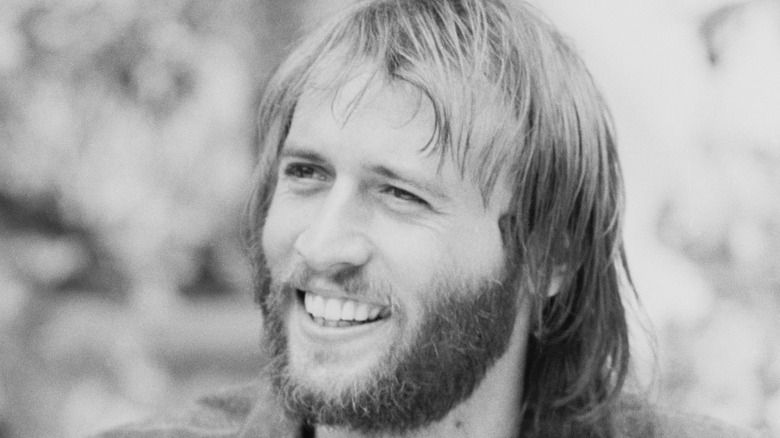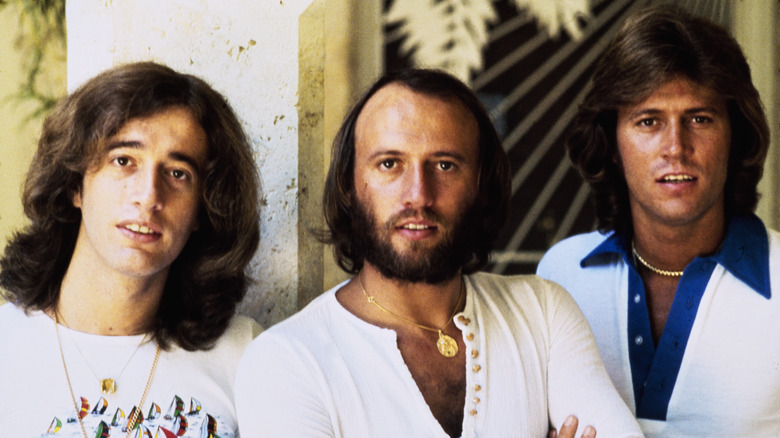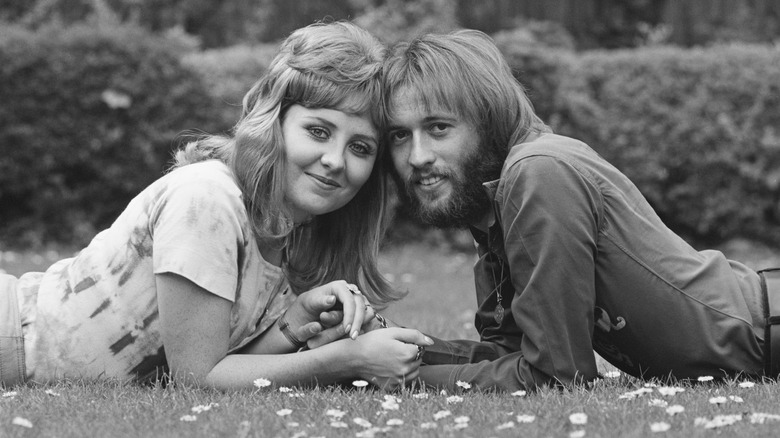Tragic Details Found In Bee Gees' Maurice Gibb's Autopsy Report
The Bee Gees were practically born into entertainment. According to Biography, in their adopted home country of Australia, Maurice Gibb, his twin, Robin, and their older brother, Barry, hosted a television program when Maurice was only 9-years-old. That same year, the trio released their first single. Coming from a musical family — their father, Hugh Gibb was a drummer and bandleader — it is unsurprising that the sons would have a career in music. What was unexpected is the heights to which Maurice and his brothers would reach.
The brothers' group, the Bee Gees, have sold more than 220 million records worldwide, per This Day in Music. At their peak in 1978, nine of the songs on the Billboard Hot 100 were written and/or performed by the Gibb brothers. The group navigated through different eras in music, releasing commercially successful music during the psychedelic era of the late 1960s and the soft rock and disco stylings of the 1970s.
However, fame and fortune in the music industry can be a double edge sword. Shortly after having their commercial breakthrough in the late 1960s, Maurice adopted the partying lifestyle of a young rock star, which strained his relationships with his brothers and his first wife. The Gibbs had a fourth brother, Andy Gibb, who had his own successful solo career before dying prematurely in 1988 after years of substance abuse. Then, in January 2003, Maurice Gibb went into surgery to remove an intestinal blockage, but he would never walk out of the hospital.
A birth defect contributed to Maurice Gibb's death
According to the South Florida Sun-Sentinel, Maurice Gibb died from his small intestine twisting itself into a knot, creating a blockage and cutting off blood flow to his bowels. During the autopsy of the 53-year-old singer, doctors found that Gibb was born with a malformed intestine that can be life-threatening in some circumstances.
On January 9, 2003, Maurice collapsed in his home and was taken to the hospital for treatment. As told by Biography, three days later, he was preparing to undergo emergency abdominal surgery when he suffered a heart attack. The surgery proceeded as the blockage had become life-threatening.
Dr. Jeffrey Raskin, interim chief of gastroenterology at the University of Miami medical school, said, "People [with his condition] can live to middle age with no symptoms. They can have minor problems off and on. Or, they can present on the first time with a catastrophic event, as it seems in this case," per the South Florida Sun-Sentinel.
The autopsy showed that parts of the small intestine were removed from Gibb, indicating that the surgeons found a section of dead bowel. Rankin, who wasn't involved in the case, said when the bowel goes too long without blood, tissue can rupture leading to waste spilling into the abdominal cavity and potentially causing life-threatening infections. The autopsy also found a 60% blockage of a blood vessel that led to the heart, leading doctors to theorize this was the cause of the heart attack.
Maurice Gibb's Family Filed a lawsuit following his death
According to The Scotsman, Barry and Robin Gibb consulted lawyers not long after their brother's death. Robin spoke about his emotions towards the hospital in relation to Maurice's passing.
"There is a tremendous amount of anger and the hospital is not off the hook. The lawyers are looking into it — they have been since the day it happened because his death was totally preventable," he said.
Despite their anger towards Mount Sinai Hospital in Miami, Maurice's widow, Yvonne Gibb, settled with the hospital out of court. The Scotsman reported that Yvonne Gibb said she did not want to sue the hospital and preferred to reach a settlement because it would be "so American" to sue.
As told by RMFW Law, the hospital accepted culpability in the death of Maurice Gibb in the agreement. The lawsuit alleged that the hospital missed signs that Maurice's intestines were twisted and were unprepared to resuscitate him, Medical Malpractice reports. The lawsuit stated it took doctors 10 minutes to find equipment to resuscitate Gibb's heart when he went into cardiac arrest.


